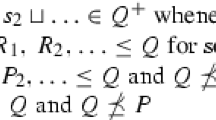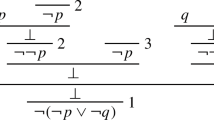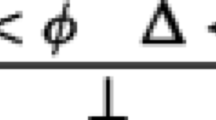Abstract
There is a curious bifurcation in the literature on ground and its logic. On the one hand, there has been a great deal of work that presumes that logical complexity invariably yields grounding. So, for instance, it is widely presumed that any fact stated by a true conjunction is grounded in those stated by its conjuncts, that any fact stated by a true disjunction is grounded in that stated by any of its true disjuncts, and that any fact stated by a true double negation is grounded in that stated by the doubly-negated formula. This commitment is encapsulated in the system GG axiomatized and semantically characterized by [deRosset and Fine, 2023] (following [Fine, 2012]). On the other hand, there has been a great deal of important formal work on “flatter” theories of ground, yielding logics very different from GG [Correia, 2010] [Fine, 2016, 2017b]. For instance, these theories identify the fact stated by a self-conjunction \((\phi \wedge \phi )\) with that stated by its conjunct \(\phi \). Since, in these systems, no fact grounds itself, the “flatter” theories are inconsistent with the principles of GG. This bifurcation raises the question of whether there is a single notion of ground suited to fulfill the philosophical ambitions of grounding enthusiasts. There is, at present, no unified semantic framework employing a single conception of ground for simultaneously characterizing both GG and the “flatter” approaches. This paper fills this gap by specifying such a framework and demonstrating its adequacy.
Similar content being viewed by others
Availability of data and material
Not applicable.
Code Availibility
Not applicable.
References
Angell, R. B. (1989). Deducibility, Entailment and Analytic Consequence. In J. Norman & R. Sylvan (Eds.), Directions in Relevant Logic (pp. 119–44). Kluwer.
Bacon, A. (2019). Is reality fundamentally qualitative? Philosophical Studies, 176, 259–95. https://doi.org/10.1007/s11098-017-1015-1
Correia, F. (2010). Grounding and Truth-Functions. Logique et Analyse, 53(211), 251–79.
Correia, F. (2017). An impure logic of representational grounding. Journal of Philosophical Logic, 46, 507–38.
Correia, F. (2018). A new semantic framework for the logic of worldly grounding (and beyond).
deRosset, L., & Fine, K. (2023). A Semantics for the Impure Logic of Ground. Journal of Philosophical Logic, 52(2), 415–93. https://doi.org/10.1007/s10992-022-09676-2
Dorr, C. (2016). To be f is to be g. Philosophical Perspectives, 30(1), 39–134.
Fine, K. (2012). Guide to Ground. In B. Schnieder & F. Correia (Eds.), Metaphysical Grounding: Understanding the Structure of Reality, (pp. 37–80). Cambridge University Press. reprinted online in ‘Philosophers Annual’ for 2012 P. Grim, C. Armstrong, P. Shirreff, N.-H. Stear (Eds.)
Fine, K. (2016). Angellic Content. Journal of Philosophical Logic, 45(2), 199–226. https://doi.org/10.1007/s10992-015-9371-9
Fine, K. (2017). A Theory of Truthmaker Content I: Conjunction, Disjunction, and Negation. Journal of Philosophical Logic, 46(6), 625–74. https://doi.org/10.1007/s10992-016-9413-y
Fine, K. (2017). A Theory of Truthmaker Content II: Subject-matter, Common Content, Remainder, and Ground. Journal of Philosophical Logic, 46(6), 675–702. https://doi.org/10.1007/s10992-016-9419-5
Fritx, P. (2022). Ground and Grain. Philosophy and Phenomenological Research, 105(2), 299–330. https://doi.org/10.1111/phpr.12822
Jackson, F. (1998). From Metaphysics to Ethics: A Defence of Conceptual Analysis. Oxford: Clarendon Press.
McSweeney, M. M. (2020). Grounding Logically Complex Facts. In M. Raven (Ed.), The Routledge Handbook of Metaphysical Ground (pp. 449–59). Routledge.
Rosen, G. (2010). Metaphysical Dependence: Grounding and Reduction. In B. Hale & A. Hoffmann (Eds.), Modality: Metaphysics, Logic, and Epistemology (pp. 109–36). Oxford University Press.
Funding
The author did not receive support from any organization for the submitted work.
Author information
Authors and Affiliations
Corresponding author
Ethics declarations
Conicts of interest/Competing interests
The author has no relevant financial or non-financial interests to disclose.
Ethical standard
Not applicable.
Informed consent
Not applicable.
Additional information
Publisher's Note
Springer Nature remains neutral with regard to jurisdictional claims in published maps and institutional affiliations.
Rights and permissions
Springer Nature or its licensor (e.g. a society or other partner) holds exclusive rights to this article under a publishing agreement with the author(s) or other rightsholder(s); author self-archiving of the accepted manuscript version of this article is solely governed by the terms of such publishing agreement and applicable law.
About this article
Cite this article
deRosset, L. A Semantic Framework for the Impure Logic of Ground. J Philos Logic 53, 463–491 (2024). https://doi.org/10.1007/s10992-023-09738-z
Received:
Accepted:
Published:
Issue Date:
DOI: https://doi.org/10.1007/s10992-023-09738-z




